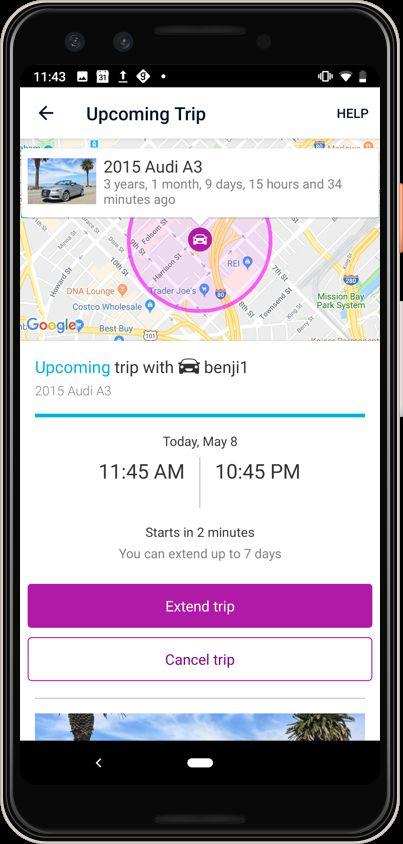
8 minute read
Car sharing brings value to all GetAround connects drivers and car owners around London
Car sharing brings value to all
During the last decade “Мobility as a Service”
Advertisement
has expanded so rapidly that today it is virtually impossible to go to a large city in
Europe without encountering cars, bicycles, and scooters for hire. Behind that rapid
increase is the need to find a more sustainable way of transport that
complements the existing infrastructure and assets.
Ever since cars became a major part of our cities authorities had to find a way to squeeze
more of them in less space. For many years the way to go forward was building large
roads and expanding the infrastructure so the demand could be met. Unfortunately this led
to more cars hitting the roads, more congestion and pollution. The transport sector

has become a target for activists and --------------- lawmakers who wish to limit the negative
impacts on the environment and improve the cities we live in. As the arguments for
changing the way we use transport services grow more people started to question their
ways of moving around.
Changing environment
Companies who work in the share economy
are becoming an integral part of transport schemes all around the world. In Cologne,
Germany, the local authorities have taken steps to find a way to incorporate car sharing
services into the transport network so the city centre is less congested and people travel
more by public transport, cycle or just walk. Other European cities have decided to give
the green light to projects like the shared electric scooters with the idea that they can
substitute for car rides in the city centres. What these projects have in common is the
idea that people should not need to own a car when they have better options.
Putting all of this into practice however is no easy task. In order to remove cars from the
roads many things need to be done. London has introduced the Ultra Low Emission Zone
(ULEZ) that currently operates in the very
centre of the city but will expand in two years time. It will force people to either leave their
cars at home or buy newer, more sustainable, models. In the heart of that program however
is sharing all available resources so they are utilised more.
Cars spent the majority of their life unused. According to a report by RAC the average
cost of owning a car in the UK, including insurance and all maintenance cost is around
£3,500 a year. Companies like Getaround have taken it upon themselves to change that
and want to have a car ready for booking, no further than five minutes away from
customers.
Sharing benefits
Getaround, an American based car sharing
company, has just entered the European market by acquiring the French Drivy. Drivy
has been in the business for around ten years and has developed a well-built network in six
European countries - France, Germany, Spain, Austria, Belgium and most recently the

UK. Getaround comes in Europe with the idea
of expanding its market and proving that its model can work. The company doesn’t own
any of the cars that are listed on its app and Katy Medlock, head of Getaround UK,
believes this is the way to transform the mobility industry.
Becoming a member of the platform doesn’t take long but Getaround has some key
requirements for both car owners and drivers. Firstly cars cannot be more than 7 years old
and they must have gone through all safety checks. Car owners need to show proof that
they own the car and it is a certified vehicle. After uploading all the necessary documents
and photos onto the system Getaround vets all applicants to ensure maximum safety.
Drivers can register in around five minutes. Getaround asks them to have at least two
years of driving experience. Booking the vehicle for registered users is a
streamlined process. All they need to do is search for a car in the area they are located
by the date and time they want the rental to start. Then they are shown the available cars
and their pricing. A daily rent during the week is around £35 and during the weekend £40.
The company takes 21% of the final earnings. Drivers are asked for a small deposit that is
used as a safety net and protects the owners. On the selected day the user goes to where
the car is located and unlocks it. The unlocking can only be done after the user has
prove its condition and any damage. The
photos are uploaded onto the app and sent to the owner. Once this is done the car can be
unlocked.
Unlocking possibilities
There are two ways to unlock the car. One is
by using the keys but Getaround are actively promoting a smart lock system based on a
telematic device. The device called Getaround Connect is linked to five systems in the car.
One is the locking mechanism so the car can be unlocked and locked again using the app
on the phone. The second is the immobiliser so the fleet managers know that their vehicles
are safe. There is a GPS that is not activated when people are driving but when parked
Getaround know exactly where every car is located. The final two Medlock says are her
favourite. The first tells how far the customer has driven and the second is connected to the
fuel indicator. If the driver returns the car with more fuel than before it was hired they get
automatically paid for it. The cars that have Getaround Connect are
more likely to get customers and the installation process is simple. The company
has partners located all around London who can install the device. The app is entirely
developed inhouse and a team of 40 engineers, located in Paris, make sure that it
meets all criteria. The installation is free of charge and with a three month trial. At the end of it owners are charged £26 per month
but the company works successfully with larger fleet owners.
Fleet management
Medlock says Getaround has some other unique features that make the company so
well positioned on the market. The platform allows anyone who owns a car to become a
member, whereas many of their competitors are focused only on peers. This means that a
company with 300 cars can register all of them on the app and the firm provides the
same service no matter how many vehicles are owned. The bigger share of cars on the
platform are not privately owned but are part of large fleets. 75% of all registers cars are
part of fleets. One of the largest suppliers in France is a
company that transports children to school. Their vehicles are not being used during the
weekend and the summer holidays when the demand is at its peak. The firm rents all of its
vehicles and makes the most of it. In the UK Getaround has been operating for about a

year under its former name Drivy and is still to
build a large supply of cars and fleets.
Scaling up
The car sharing industry can only work on
scale and that is the reason why Getaround are trying to attract more and more partners.
Medlock says that the future of driving in the city will be on platforms like theirs and
companies who own the vehicles. Both will work together to provide the best service to
anyone who needs a car. So far Getaround works with fleets in the central London.
Getaround works closely with the authorities in London so it can provide parking spaces
and get more residents onboard. According to Medlong the British capital is well ahead
compared to other cities and local authorities understand that firms like Getaround are not
their enemy but could complement and improve transport.
In Barcelona the partnership between the city council and the firm has led to a scheme
where riders get access to the city bikes. This improves the overall transport experience and minimises the amount of time people drive
around. Paris is leading the market with around 2000 cars on the platform. The
company also partners with companies who provide parking spaces like JustPark. Finding
a free spot is an important part of the whole service and the company dedicates a lot of its
attention to making sure there are enough lots. In London the firm has been rapidly
expanding in Zone 1 and 2. Its plans are to start operating in another large British city in
the following six to nine months. Medlock says that they have invested greatly in the last year
so they can meet the demand and stay competitive.
Success stories
It is hard to say how much car owners earn every month as it depends on various factors.
When a fleet company dedicates all of their cars to the platform their earnings are
significantly higher compared to those of a private owner who does that only during the
weekend for example. Some have successfully built their operations.

Thanks to Katy Medlock for her interview which made this article possible. Katy Medlock started her career in car sharing in New Zealand working for a traditional rent-a-car company. After the company invested in a carsharing firm Medlock took over their marketing and helped them build brand awareness and marketing campaigns. After returning to London Medlock, who had already decided she wants to develop her career in the mobility sector, started knocking on the doors of car sharing companies and found her current position with Getaround.
Thank you!
Thank you for reading and to all of the
amazing people who were happy to be interviewed. Without your support this
magazine would not have happened.
This has been my first independent publication and I hope you enjoyed it - if you
have feedback, would be happy to be interviewed or to advertise then I would be

truly grateful if you contact me. If you like this please let others know so I can
build readership and get you more great content.
Never miss anything by connecting on Twitter @LogisticsPoint
LinkedIn TheLogistics Point Instagram @thelogisticspoint
Google+ Is this still a thing?
To contact Nick Bozhilov nick@thelogisticspoint.com
(+44) 7856386677
All articles © The Logistics Point 2020 and cannot be copied without consent. Photos by The Logistics Points, The Port of Los Angeles, PiggyBee, Axion, GetAround and FM



